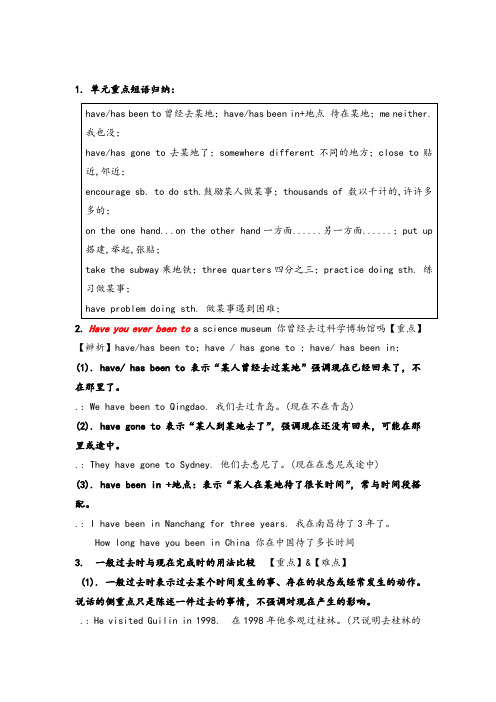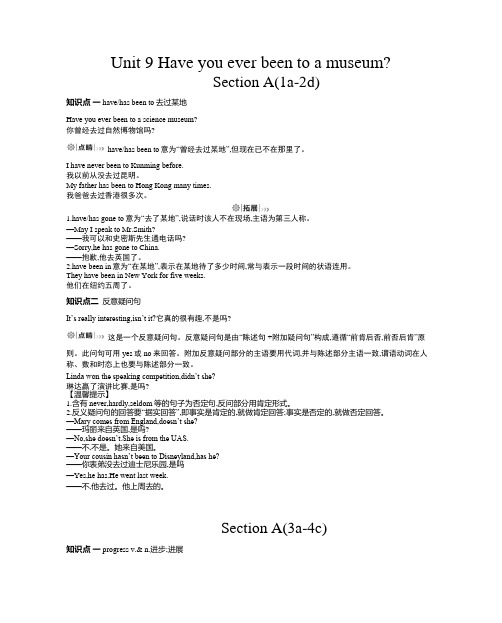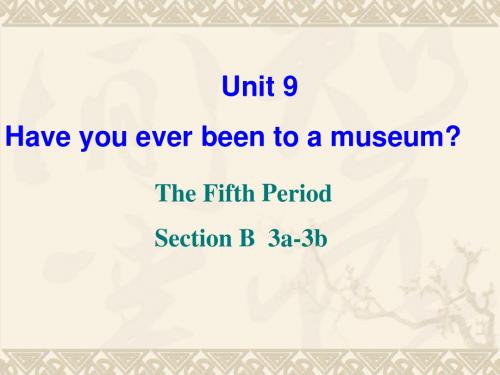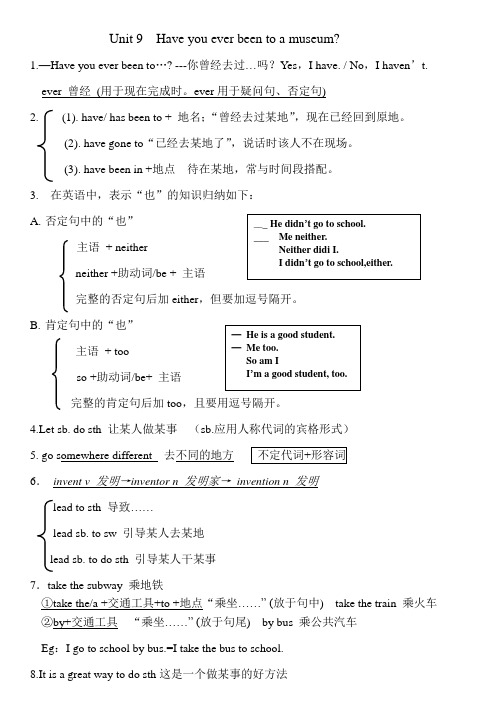Unit9Have you ever been to a museum sectionB(1a-1d)(课件(29张)+音视频+练习)
unit9haveyoueverbeentoamuseum知识点梳理及单元复习

1. 单元重点短语归纳:2. Have you ever been to a science museum 你曾经去过科学博物馆吗【重点】【辨析】have/has been to;have / has gone to ;have/ has been in;(1). have/ has been to 表示“某人曾经去过某地”强调现在已经回来了,不在那里了。
.: We have been to Qingdao. 我们去过青岛。
(现在不在青岛)(2). have gone to表示“某人到某地去了”,强调现在还没有回来,可能在那里或途中。
.: They have gone to Sydney. 他们去悉尼了。
(现在在悉尼或途中)(3). have been in +地点:表示“某人在某地待了很长时间”,常与时间段搭配。
.: I have been in Nanchang for three years. 我在南昌待了3年了。
How long have you been in China 你在中国待了多长时间3. 一般过去时与现在完成时的用法比较【重点】&【难点】(1). 一般过去时表示过去某个时间发生的事、存在的状态或经常发生的动作。
说话的侧重点只是陈述一件过去的事情,不强调对现在产生的影响。
.: He visited Guilin in 1998. 在1998年他参观过桂林。
(只说明去桂林的时间)(2). 现在完成时表示动作发生在过去,对现在造成了影响或产生了结果。
不能与确定的过去时间状语连用。
.: Jill has bought a new computer. 吉尔买了一台新电脑。
I have taught here for fifteen years. 我在这儿教学已经15年了。
I have seen the film. 我看过这部电影。
(我了解这部电影的内容)I saw the film last week. 我上周看了这部电影。
八年级下册Unit9Haveyoueverbeentoamuseum重点短语句型汇总

八年级下册Unit 9 Have u ever been t a useu?重点短语句型汇总八年级下册Unit9Haveueverbeentauseu?重点短语句型汇总一、重点短语frananaatnight在夜晚2inarenaturalenvirnent在一个加倍自然的环境中3allearrund一年到头;终年4befarfr离……远inthedar在黑暗中6inthepast在过去7havebeentsp去过某地8sieneuseu科学博物馆9histruseu历史博物馆auseentpar游乐园1gseheredifferent去不同的地址2gsating去滑冰3taethesuba坐地铁4agreatatspendaSaturdaafternn一个过周六下午的好方式alltheldvieaeras所有的古老的电影摄影机6learnabutsth解有关。
的情形7ntheeeend在周末8apintheuntains在大山里露营9putupatent搭帐篷20insuharapida以如此迅猛的方式21differentindsf各类各样的22develpentftilets茅厕的进展23sialgrups社会集体24theteaartperfranes茶艺演出2aeaperfetupfteaithbeautifulteasets用漂亮的茶具沏一杯完美的茶26anieplaetentea一个品茶的好地址27thusandsf数以千计的28InternatinaluseufTilets国际茅厕博物馆29theTerrattaAr兵马俑30SutheastAsia东南亚31NightSafari夜间动物园32threequarters四分之三33anEnglish-speainguntr一个讲英语的国家34haveprbledingsth做某事很困难3duringthedatie在白天36auplefties好几回37rightn此刻;目前38anauseentparithaspeialthee一个有专门的主题的游乐园39alarundthepar在公园里处处走40hearf听说41taearide兜风42antherprvine另一个省43theBird’sNest鸟巢44enuragesbtdsth鼓舞某人做某事4nthenehandnthetherhand一方面,另一方面二、重点句型Haveueverbeent?Haveueverbeentasieneuseu?你曾经去过科学博物馆吗?2Let’s。
人教版新目标Unit9_Have_you_ever_been_to_a_museum全单元

TALK
neither have I = me neither .
I have been to the zoo a lot of times. 答语
______________ .\
. ( 我也是)
I’ve never been to a water park. 答语
____________ \ _______ . ( 我
• 1 h过某地(去过已回来);
• 2 have / has gone to +地名 去了某地(还没回来);
• 3 have / has been in +地名 在某地住了有多长。
• A: Have you ever been to the Great Wall? • B:Yes, I have. What about you? • A: Me too. • =So have I. • =I have ever been there, too. • So+助动词/be动词/情态动词+主语.
4. A: How about __g_o_i_n_g___ (go) to the art museum? There are some special German paintings there right now.
B: Sure. When do you want _t_o_g_o___ (go) ? 5. A: Have you ever __v_is_i_te_d___ (visit) the
• A: Have you ever been to the Great Wall? • B: No, I haven’t. What about you? • A: Me neither. • =Neither have I. • =I haven’t been there, either. • Neither+助动词/be动词/情态动词+主语.
人教新目标版初中英语八年级下册Unit9Haveyoueverbeentoamuseum要点讲解

Unit 9 Have you ever been to a museum?Section A(1a-2d)知识点一have/has been to去过某地Have you ever been to a science museum?你曾经去过自然博物馆吗?have/has been to意为“曾经去过某地”,但现在已不在那里了。
I have never been to Kunming before.我以前从没去过昆明。
My father has been to Hong Kong many times.我爸爸去过香港很多次。
1.have/has gone to意为“去了某地”,说话时该人不在现场,主语为第三人称。
—May I speak to Mr.Smith?——我可以和史密斯先生通电话吗?—Sorry,he has gone to China.——抱歉,他去英国了。
2.have been in意为“在某地”,表示在某地待了多少时间,常与表示一段时间的状语连用。
They have been in New York for five weeks.他们在纽约五周了。
知识点二反意疑问句It’s really interesting,isn’t it?它真的很有趣,不是吗?这是一个反意疑问句。
反意疑问句是由“陈述句 +附加疑问句”构成,遵循“前肯后否,前否后肯”原则。
此问句可用yes或no来回答。
附加反意疑问部分的主语要用代词,并与陈述部分主语一致,谓语动词在人称、数和时态上也要与陈述部分一致。
Linda won the speaking competition,didn’t she?琳达赢了演讲比赛,是吗?【温馨提示】1.含有never,hardly,seldom等的句子为否定句,反问部分用肯定形式。
2.反义疑问句的回答要“据实回答”,即事实是肯定的,就做肯定回答;事实是否定的,就做否定回答。
—Mary comes from England,doesn’t she?——玛丽来自英国,是吗?—No,she doesn’t.She is from the UAS.——不,不是。
人教版英语八下U9Have you ever been to a museum 讲义

Unit9 Have you ever been to a museum?一、重点词汇及拓展1. amusement n. 娱乐;游戏e.g. The old ladies played the games just for amusement.老太太们玩这个游戏只是为了取乐。
amuse v. 消遣,逗笑;使开心,使愉快amusing adj. 有趣的,好玩的,好笑的amused adj. 被逗乐的;感到好笑的2.amusement park 游乐场e.g. The amusement park is open from May through October.游乐园从五月到十月开放。
3.somewhere adv. 在何处;到某处pron. 某个地方e.g. Maybe the keys are somewhere in the dining room.也许钥匙在餐厅某个地方。
I need to find somewhere to stay tonight.我得找到今晚要住的地方。
4.camera n.照相机;摄影机;摄像机e.g. I heard your parents bought you a cameras as a gift.我听说你的父母亲给你买了一台照相机作为礼物。
5.invention n.发明;发明物e.g. Do you think mobile phone is a great invention?你认为手机是一个伟大的发明吗?6.invent v.发明;创造inventor n.发明家invention n.发明;发明物e.g. As we all know that Edison invented light bulb.我们都知道爱迪生发明了灯泡。
7. unbelievable adj. 难以置信的;不真实的unbelievably adv. 难以置信地;不真实地unbelievably bad/good 坏得/好得令人难以置信incredible adj. 难以置信的e.g. I still find this story both fascinating and unbelievable.我仍然觉得这个故事非常有趣和难以置信。
(完整版)优秀课件unit-9-Have-you-ever-been-to-a-museum

zoo
A: Have you ever been to a zoo? B: Yes, I’ve been to a zoo.
space museum 太空馆
A: Have you ever been to a space museum? B: No, I’ve never been to a space museum.
6.He has been in London for half a month. 他来伦敦已有半个月了。
1.sb.have /has been to sp. 意为“某人曾经去过某地”,
但现在已不在那里了, ”已经回来,侧重指经历,后 可接次数, 如once, twice, three times等, 表示 “去过某地几次”, 也可和 just, never, ever等连用。
4.我了解了一些电影的知识。 I _le_a_r_n_e_d_a_b_o_u_t_ some information about movie. 5.他的粗心导致了这次失败。 His carelessness _l_e_d_ _t_o_ this failure.
选用have, has填空: 1.I __h__a_v_e_ told him the news. 2.She ___h_a_s___ come back from school. 3.You ___h_a_v_e__ won the game.
2.sb.have/has gone to sp.
意为“某人已经去某地了”, 可能在去某地的路上, 也可能到达了某地。总之, 说话时该人不在现场, 一般不用第一人称、第二人称代词作句子的主语。
3.sb.have/has been in sp.
表示“在某地呆了多少时间”, 常与时间段状语连用
Unit 9Unit_9_Have_you_ever_been_to_a_museum B 3a-3c

6. — What about these two sweaters,madam? — _____of them fits me. Could you show me another one? A. Both B. Either C. None D. Neither 7. — Where is Zhang Ming? — Oh, don’t you know he _____ to Beijing to see his parents and he’ll be back tomorrow? A. has gone B. has been C. had gone
One great thing about … is …
One
great thing about Hainan is that you can try many kinds of sweet fruit in Hainan. If you go to Hainan, I’m sure you will enjoy yourself.
(3a)
Pre-writing
Make a list of facts about your hometown or a place you have been to. Think about these topics.
Size and location:_________________ Population:_______________________ Weather:________________________
Things:___________________________
Hainan Island
Have you ever tried/seen/been…?
Unit-9--Have-you-ever-been-to-a-museum--知识整理

Unit 9 Have you ever been to a museum?1.—Have you ever been to …? ---你曾经去过…吗?Yes ,I have. / No ,I haven ’t. ever 曾经 (用于现在完成时。
ever 用于疑问句、否定句)2.(1). have/ has been to + 地名;“曾经去过某地”,现在已经回到原地。
(2). have gone to “已经去某地了”,说话时该人不在现场。
(3). have been in +地点 待在某地,常与时间段搭配。
3. 在英语中,表示“也”的知识归纳如下:A. 否定句中的“也”主语 + neitherneither +助动词/be + 主语 完整的否定句后加either ,但要加逗号隔开。
B. 肯定句中的“也”主语 + tooso +助动词/be+ 主语 完整的肯定句后加too ,且要用逗号隔开。
4.Let sb. do sth 让某人做某事 (sb.应用人称代词的宾格形式)5. go somewhere different 去不同的地方 6. invent v 发明→inventor n 发明家→ invention n 发明lead to sth 导致……lead sb. to sw 引导某人去某地lead sb. to do sth 引导某人干某事7.take the subway 乘地铁①take the/a +交通工具+to +地点“乘坐……” (放于句中) take the train 乘火车 ②by+交通工具 “乘坐……” (放于句尾) by bus 乘公共汽车Eg :I go to school by bus.=I take the bus to school.8.It is a great way to do sth 这是一个做某事的好方法9. go skating 去滑冰10. .on the weekend 在周末11. science museum 科学博物馆history museum 历史博物馆12.all the old movie cameras所有的古老的电影摄影机13.camp in the mountains 在大山里露营14.learn about 了解获知,得知learn about sth.了解有关……的情况15. an amusement park 一个游乐场16. the International Museum国际博物馆17. put up a tent 搭帐篷put up 搭起;举起;张贴rmation信息;资料(不可n.)some informationa piece of information 与about 连用,表示:“关于……的信息”19.It’s unbelievable that+从句“令人难以置信的……”20. make progress 取得进步make progress in 在......方面取得进步21.in such a rapid way 以如此迅猛的方式22.play chess 下棋23.be able to+V原能够做某事24.in the future在将来25.wonder 想要知道= want to know①后接从句eg:I wonder who she is.②也可接“疑问词+不定式”eg: I wonder what to do next.26.I couldn’t believe my eyes我无法相信我的眼睛。
- 1、下载文档前请自行甄别文档内容的完整性,平台不提供额外的编辑、内容补充、找答案等附加服务。
- 2、"仅部分预览"的文档,不可在线预览部分如存在完整性等问题,可反馈申请退款(可完整预览的文档不适用该条件!)。
- 3、如文档侵犯您的权益,请联系客服反馈,我们会尽快为您处理(人工客服工作时间:9:00-18:30)。
Revision Complete the sentences. 1. 她已经去火车站见她朋友了。
She _h_a_s__g_o_n_e__ to the train station to meet her friend. 2. 谢谢你所做的一切。
Thanks for all that you _h_a_v_e_ _d_o_n_e_. 3. 我很久没有看到你了。
Have you visited…? Have you been to…? Have you seen…?
Warming up What places of interest have you been to? Have you ever been to these places?
the Great Wall
Discussion
Discussion
Have you ever been to these places?
When did you go there?
Talk about it with your partner.
பைடு நூலகம்
--- Have you ever been to …? --- Yes, I have. / No, I haven’t.
the Palace Museum
the Terracotta Army
the Bird’s Nest
1a Match the pictures with the names.
the Terracotta Army the Great Wall the Bird’s Nest
the Palace Museum
the Great Wall
the Palace Museum
the Terracotta Army
the Bird’s Nest
1b
Listen to a student interviewing a foreign student. Check (√) the questions you hear.
I __h__a_v_en_’_t__s_e_en_ you for a long time. 4. 雨下了多久了?
How long _h_a_s__ __i_t__ _b_e_e_n_ raining?
objectives
1. To know some famous places in China. 2. To listen for specific information. 3. To learn to use the present perfect tense.
Unit 9Have you ever been to a museum? Period(Four)SectionB(1a-1d)
版本:人教版八年级下册
Lead in Enjoy a video and answer what places of interest have you been to?
Listen again and fill in the blanks. Peter _h_a_s__b_ee_n_ in China for two weeks. He _is__g_o_in_g_ back to Australia tomorrow. He has _s_e_e_n_ many interesting things here. He went to the Palace Museum last week. There are _so__m_a_n__y_ beautiful _tr_e_a_s_u_r_e_s. He alsoh_a_s_b__ee_n__t_o_ the Great Wall and the Bird’s Nest. He thinks the Terracotta Army in Xi’an is very f_a_n_t_a_s_ti_c_. He loves _C__h_in__es_e__fo_o_d_ very much. His _fa_v_o_r_i_te_ dish is Beijing Duck.
√____ Have you visited the Palace Museum? √____ Have you been to the Great Wall?
____ Have you been to the Bird’s Nest?
____ Have you seen the Terracotta Army?
√____Have you tried Chinese food?
1c Listen again and take notes.
Name: __P__e_te_r___________________ Country: __A_u__st_r_a_li_a______________ How long in China: __t_w_o__w_e_e_k_s____ Places visited: ___t_h_e__P_a_la_c_e__M_u__se_u_m__,_t_h_e_G__r_ea_t__W__a_ll_, _t_h_e_B_i_r_d_’_s_N_e_s_t_(_in__B_e_i_ji_n_g_)_, _th_e__T_e_r_r_a_c_o_tt_a_A__r_m_y__(i_n___ _X_i_’_a_n_) _________________________________________ Food: __B_e_ij_i_n_g_D__u_c_k______________
Pair work
1d What places have you been to? Ask your
partner.
Have you visited…?
Have you been to…?
Have you seen…?
Have you tried…?
A: Have you visited Xi'an? B: Yes, I went there last summer. A: Have you been to the Terracotta Army? B: Of course. It was fantastic. A: Have you seen …? A: Have you tried …?
